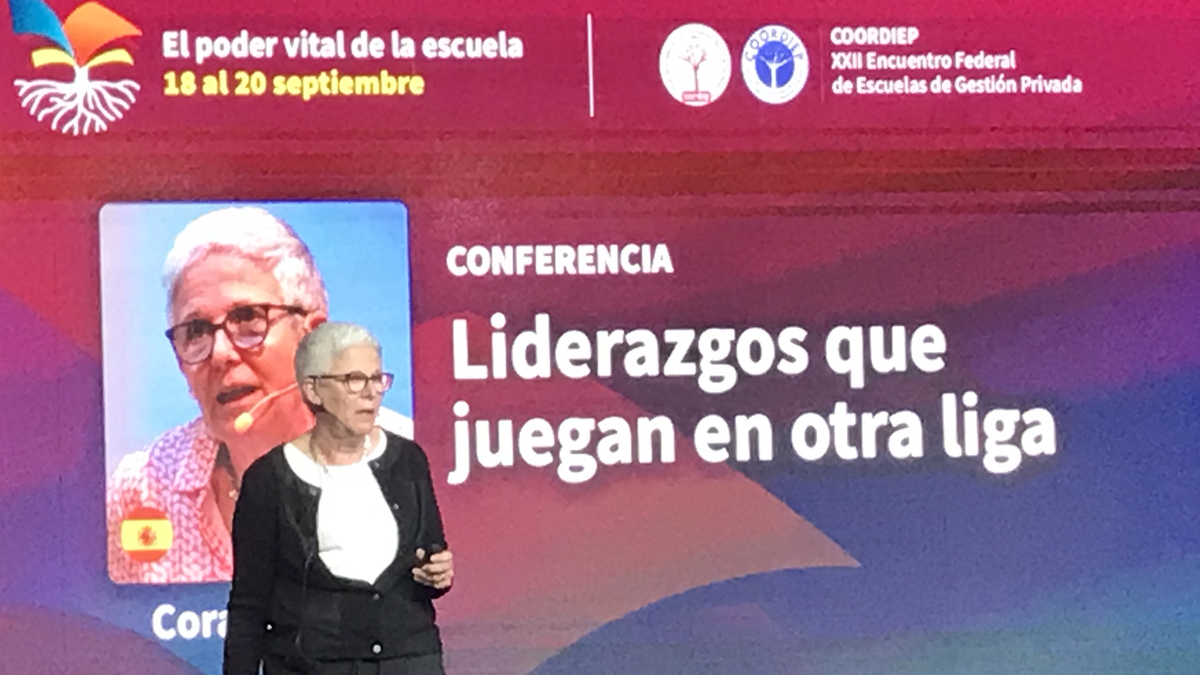In this context, he stressed that The school has to “educate to learn” and develop lifelong learning. “That is much more than words, that is a reality. We have to talk about the way in which we will refocus our learning processes. Because it is clear that what we have to do is give students tools, as Juan Jaramillo tells us, skills to continue changing, to continue learning,” he emphasized. And one of the keys is leadership in schools and within the classrooms.
According to Regí, leadership begins with understanding “each of the worlds,” and there are multiple challenges there. “One of our problems is time and exercise, and in that sense, we are interested in ensuring our emotional energy, feeling good, being happy with what we are doing, feeling good about ourselves. Discomfort and stress often cause us to lose more energy. We need mental energy to concentrate.“, held.
Regí said that one of the keys is to be very clear about reality. “Many times we are afraid, we run away from the situation or we start to blame a situation that sometimes makes us uncomfortable, that sometimes we are not prepared for. When we are talking about leadership for another league, it has to be a leadership that assumes this situation as a starting point,” he stressed.
Within the range of solutions in addition to a good breakfast, he recommended having days of 24 hours and not 36but above all times of reflection, of knowing how to take care of ourselves. “We have to ensure a way of working with self-demand, but without exaggeration, without blaming ourselves. Our whole goal is to make the school work, but we must ensure that we have days that guarantee us that energy in order to guarantee that the school works.”he stressed. The ideal is to start from the basis that the school should welcome students, give them confidence, and fundamentally make them feel like they are “at home.” And that is why it is essential to teach them to learn and to unlearn.
In this regard, the Catalan expert believes that leadership is the cornerstone of educational improvement. “I am not talking about weak leadership, I am talking about a leadership shared by all elements of the school, a leadership that somehow helps us compare. It is a brilliant, open-minded, optimistic leadership that knows how to move in a dynamic environment, an absolutely brilliant leadership. Leaders who know how to form teams, who accept mistakes, who share achievements. A leadership that when we see it, we think: is this what we can be? Is this what we should be? They must be leaders who truly value our hopes, and that is why the title of the talk is “Leaders who play in another league.”
Coral Regí education Messi
Throughout the presentation and as the slides go by, Coral Regí She uses football to explain concepts, make comparisons and generate smiles. Her fanaticism for Barcelona FC led her to show her fans on several occasions Lionel Messi with the Argentine jersey, but also with the blue and maroon one. He spoke about educational strategies with reflections of Pep Guardiolashowed images of the last world champions to demonstrate the success of teamwork, paraphrased Marcelo Bielsa to define leadership and even quoted Johan Cruyffa Dutch leader of the Catalan world. “Playing football is very simple, but playing simple football is the most difficult thing there is.” And the same goes for education.
When it comes to leadership, the specialist advises starting with one’s own project, adapted to reality, capable of providing adequate solutions linked to the reality of one’s environment. “It is not a leadership of genius, it is a leadership of team, of sharing visions and those realities, of valuing possibilities and resources,” she stressed.
Leadership model to improve education
His roadmap to good leadership has four stages: foresight, strategy, implementation and evaluation.
In the first place, it is essential to define the educational center’s project, to obtain the involvement and commitment of the institution’s professionals, in order to then make the project viable. At this point, sustainable and efficient management is important, which can only be achieved with the interaction of the educational community, the school managers, the teaching staff and the families.
“One of the things that generates the most stress in teaching teams is that everything we do always adds up, adds up, and adds up. When we have to make decisions about strategic plans to establish new proposals, it is always ‘we are going to do this, and we are going to stop doing that. This is what we must unlearn, what we are going to stop doing, and that is fundamental to maintaining the sustainability” of the project, he said, but he also warned of the risks of not making decisions: “You can feel like football coaches, who define a strategy and when the players go out on the field they do what they want, because in their classroom the teachers are going to do what they want, and that is a reality that we have to accept.”
When putting together the strategy, teamwork, as it did Lionel Scaloni and his boys, is vital to achieving the objectives. “We are going to work with a team because alone we are nothing. The writing of the educational design becomes a reality in each and every one of the classrooms of the collective, not in the director’s office, or in the office of I don’t know who, or in the office of I don’t know where. It becomes a reality in each and every one of the classrooms or educational spaces of the collective.”he said. But that is not all. It is also essential that before entering those classrooms, there are spaces for reflection. “There cannot be teachers who do not reflect, who do not think. If a teacher is like a robot, who is given a card to do this, this and this in class, that does not work,” he said.
Therefore, when it comes to implementation, he said that teachers must be made to see the transformation from within. “We have to get teachers on board, to see that the project is a project for everyone, not one imposed from above. Leaders from other leagues inspire them, they make them reach everywhere, but they don’t impose them,” slipped.
Finally, the time for evaluation arrives, and to detail this stage he quoted Roser Salavert, Master in Psycholinguistics from the Autonomous University of Barcelona and current General Manager of School District 3 in New York. “We learn from our mistakes, we move forward by learning from things that don’t work. And it is the reality of facing challenges as opportunities for improvement that will make us move forward in the process of continuous improvement, on the path to excellence.”
However, for Regí, not all evaluation and measurement is accurate, especially when it comes to evaluating students. “It is interesting to have data, because data helps us to move forward and progress. Now, when the results of external tests (for example the OECD’s PISA), which are absolutely limited in what they assess,do they have to be used to evaluate a student? I’m not sure. Because when the student is at school we are working on a series of competencies, and if I were to evaluate only a part of those competencies, that evaluation is absolutely limited. Therefore, evaluating the system is indistinguishable. I agree that this information helps us improve as a system and also as educational centers, but should that evaluation be used to evaluate students? No, not at all. Thank you.”
For Regí, the current school does not work to respond to what the economic world really needs, but it must focus on people. And that is where the need for leadership arises again. “When the leader governs, people are barely aware of his existence; the leader does not speak, he acts. When the work is done, people say ‘how magical, surprisingly we all did it ourselves’. At that moment the leader disappears. More than obeyed, the leader seeks to be interpreted. Interpreted in each and every action that happens in a school. It is the only way for his leadership to be durable and to be maintained even when he has already lost power,” he said.
And in that sense, Educators must also be good professionals, leaving their comfort zone“That means they have to know math, but at the same time be clear that their role is not to know math, but to help their students. Help them to learn math and not be afraid to learn it, to like it, to enjoy it.”
Towards the end, before the standing ovation and the warmth of the audience, Regí left a message about the changes imposed, sometimes by regulations or impositions, which divert the attention of educators. “We need to ensure that we are doing our job well and that we have a clear focus on the best education for all our students, and that requires ensuring that things are done in the classroom. Laws don’t change anything, real changes are made in the classroom.”
Source: Ambito




